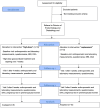High-dose glucocorticoid treatment vs. glucocorticoid replacement in immune checkpoint inhibitor associated hypophysitis (CORTICI): an open, randomised controlled trial
- PMID: 39862267
- PMCID: PMC11770865
- DOI: 10.1080/07853890.2025.2453829
High-dose glucocorticoid treatment vs. glucocorticoid replacement in immune checkpoint inhibitor associated hypophysitis (CORTICI): an open, randomised controlled trial
Abstract
Objective: One of the most severe endocrine side effects of immune checkpoint inhibitors (ICI) is hypophysitis leading to adrenal insufficiency. Recovery is rare, although it has been reported after high-dose glucocorticoid treatment. This is the first randomised study to evaluate whether hormonal recovery differs in patients treated with high-dose glucocorticoids versus glucocorticoid replacement therapy.
Design/methods: In this single-centre, open, randomised controlled study, patients with ICI associated hypophysitis were randomised 1:1 to high-dose glucocorticoid treatment (1 mg/kg of prednisolone for two weeks, followed by tapering until week 7 and a switch to hydrocortisone 20 mg total daily dose in week 8) or glucocorticoid replacement therapy (hydrocortisone 20 mg total daily dose) over 8 weeks. The primary outcome was the frequency of hormonal axes recovery.
Results: Between 17th April 2019 and 16th September 2022, 18 out of the 20 randomised patients finished the trial; eight completed high-dose, 10 glucocorticoid replacement. Nine patients presented with hyponatraemia, two had typical changes on MRI, 12 had isolated adrenal insufficiency, and six had an additional hormone deficiency. None of the patients in neither group experienced a recovery in adrenal function. One patient in each group showed amelioration of hypogonadism. There was a significant, unfavourable treatment effect of high-dose treatment on HbA1c (mean treatment effect 5.16, 95% confidence interval 0.31 to 10.02, p = 0.039).
Conclusions: High-dose glucocorticoid treatment was not effective in restoring adrenal function and leads to adverse effects on glucose metabolism. We therefore do not recommend its use for the treatment of ICI associated hypophysitis, except for compressive symptoms.
Keywords: Immune checkpoint inhibitor associated hypophysitis; adrenal insufficiency; endocrine adverse events; hypopituitarism.
Conflict of interest statement
No potential competing interest was reported by the authors.
Figures
Similar articles
-
Recovery from secondary adrenal insufficiency in a patient with immune checkpoint inhibitor therapy induced hypophysitis.J Immunother Cancer. 2019 Sep 12;7(1):248. doi: 10.1186/s40425-019-0729-3. J Immunother Cancer. 2019. PMID: 31511065 Free PMC article.
-
Effect of once-daily, modified-release hydrocortisone versus standard glucocorticoid therapy on metabolism and innate immunity in patients with adrenal insufficiency (DREAM): a single-blind, randomised controlled trial.Lancet Diabetes Endocrinol. 2018 Mar;6(3):173-185. doi: 10.1016/S2213-8587(17)30398-4. Epub 2017 Dec 8. Lancet Diabetes Endocrinol. 2018. PMID: 29229498 Clinical Trial.
-
Immune checkpoint inhibitor-mediated hypophysitis: no place like home.Clin Med (Lond). 2023 Jan;23(1):81-84. doi: 10.7861/clinmed.2022-0429. Clin Med (Lond). 2023. PMID: 36697002 Free PMC article.
-
Daily Glucocorticoid Replacement Dose in Adrenal Insufficiency, a Mini Review.Front Endocrinol (Lausanne). 2022 Jun 29;13:897211. doi: 10.3389/fendo.2022.897211. eCollection 2022. Front Endocrinol (Lausanne). 2022. PMID: 35846313 Free PMC article. Review.
-
Glucocorticoid replacement regimens for treating congenital adrenal hyperplasia.Cochrane Database Syst Rev. 2020 Mar 19;3(3):CD012517. doi: 10.1002/14651858.CD012517.pub2. Cochrane Database Syst Rev. 2020. PMID: 32190901 Free PMC article.
Cited by
-
Letter to the Editor: 'High-dose glucocorticoid treatment vs. glucocorticoid replacement in immune checkpoint inhibitor-associated hypophysitis (CORTICI): an open, randomized controlled trial'.Ann Med. 2025 Dec;57(1):2491661. doi: 10.1080/07853890.2025.2491661. Epub 2025 Apr 15. Ann Med. 2025. PMID: 40231495 Free PMC article. No abstract available.
References
-
- Kobayashi T, Iwama S, Yasuda Y, et al. . Pituitary dysfunction induced by immune checkpoint inhibitors is associated with better overall survival in both malignant melanoma and non-small cell lung carcinoma: a prospective study. J Immunother Cancer. 2020;8(2):e000779. doi: 10.1136/jitc-000779. - DOI - PMC - PubMed
Publication types
MeSH terms
Substances
LinkOut - more resources
Full Text Sources
Other Literature Sources
Medical
Miscellaneous


